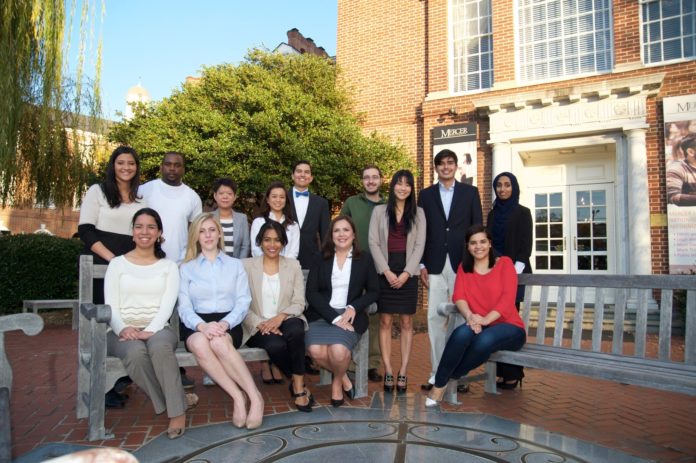The top of Coleman Hill offers a sweeping overview of downtown Macon. The best vantage point may be from one of those white rocking chairs on the porch of Mercer Law School —but inside the building itself, the view is very much an international one.
“The world is shrinking, and law practice is becoming more global.” says Dean Daisy Hurst Floyd. “Whether our graduates find themselves working in Atlanta, working in London or working in Vidalia, they are going to be in a world that's very different than it was 30 years ago. We want to be pro-active in making sure that our students are prepared for operating in that global environment.”
For attorneys already practicing as well as for incoming law students preparing to be 1L's, facility with international and comparative law is no longer an exotic skill but a daily part of legal life.
“It's not just for lawyers practicing in firms who now have offices in seven cities of the world,” Floyd says. Law doesn't recognize borders and time zones any longer. Attorneys working for small firms in Middle Georgia regularly represent clients from around the world. The State of Georgia has itself become a center for international trade and travel. “Many of our students come to us already with a lot of international experience under their belts,” Floyd says. And they're looking for more.
Mercer Law School is answering that expectation. To meet the broad-horizon expectations of incoming students and to assure global readiness for young attorneys after graduation, Dean Floyd has named Professor David Ritchie the Law School's Director of International Initiatives.
Along with increasing visibility of the Law School's current international academic and extracurricular programs, his goals include coordinating with current faculty to ensure cohesion in the international law curriculum and identify ways to increase course offerings;collaborate with the offices of Admissions and Career Services to maximize students' career development goals in international arenas;explore and increase new possibilities for faculty and students in summer study abroad programs and exchanges with foreign universities, and more.
Ritchie knows his territory, literally. He has taught extensively at schools in Rio de Janeiro, Brazil and Macau, one of China's two Special Administrative Regions. For three years he has hosted delegations of Brazilian judges to the Mercer campus, promoting an intercultural exchange between Brazilian jurists and U.S. legal scholars, students, judges and practitioners. The program, which will occurred a fourth time this October, is aimed at expanding understanding about the different legal systems around the world.
International connections already abound at Mercer. The Law School includes four faculty whose work focuses on international law. Several of them —Professors Mark Jones, Scott Titshaw, and Shand Watson —are graduates of international education themselves. Other professors regularly teach overseas in Summer Abroad programs cosponsored by Mercer Law. Countries include Argentina, Germany, the Netherlands, China and Spain. Every year Mercer students likewise expand their legal understanding with jobs and internships outside of the States.
Even outside the regular school-year parameters, some Law School professors are expanding their international connections. Professor Linda Jellum has taught statutory interpretation four times to judges in Tbilisi, Georgia. And Professor Titshaw spent the academic year on an international Fulbright Scholarship at the European University Institute in Fiesole, Italy, and Leiden University in The Hague, researching comparative European laws on immigration and internal migration among European same-sex families and their children.
“Diversifying the student body is good for everybody,” says Ritchie. “All of our students will get to see firsthand how the world is global. They'll be having classes with students from Russia or Macau and see why it's important to have an understanding of international relations and how law practice intersects with what's going on in the world. We also need to bring in some of our alumni who are now in practice, or have been in practice for 20 or 30 years and let them explain their international contacts, the work they do and the range of clients they have.”
These international initiatives are the next phase of the Law School's expansion into an international way of thinking. Last year's Mercer Law Review Symposium focused on “Current Trends in International Trade and Their Impact on Multinational Businesses.” A student team competes each year in Philip C. Jessup International Law Moot Court Competition, the world's largest, where they argue a case between fictional countries before the International Court of Justice.
Ritchie has several International Initiative goals in mind for Mercer. “I'm working on arrangements with law schools from around the world,” he says. “We're working on a program right now with a law school I work with in Brazil. If we come out of this school year with three or four strong institutional partnerships in different parts of the world —Latin America, Europe and Asia as a start for our focus —we can start to build on those partnerships, exchange students and faculty, and create programs together.”










